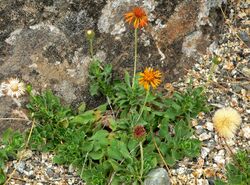Biology:Haplopappus
From HandWiki
Short description: Genus of flowering plants
| Haplopappus | |
|---|---|

| |
| Haplopappus foliosus | |
| Scientific classification | |
| Kingdom: | Plantae |
| Clade: | Tracheophytes |
| Clade: | Angiosperms |
| Clade: | Eudicots |
| Clade: | Asterids |
| Order: | Asterales |
| Family: | Asteraceae |
| Subfamily: | Asteroideae |
| Tribe: | Astereae |
| Subtribe: | Machaerantherinae |
| Genus: | Haplopappus Cass. conserved spelling[1] |
| Type species | |
| Haplopappus glutinosus Cass.[2] | |
| Synonyms[3] | |
| |
Haplopappus is a genus of flowering plants in the family Asteraceae found in South America, mostly restricted to the dry regions of the Southern Andes, Chilean Matorral, and Patagonia.[4][1]
Taxonomy
Species
Species accepted by the Plants of the World Online as of December 2022:[5]
- Haplopappus albicans Benoist
- Haplopappus angustifolius Reiche
- Haplopappus anthylloides Meyen & Walp.
- Haplopappus baylahuen J.Rémy
- Haplopappus bezanillanus (J.Rémy) Reiche
- Haplopappus boelckei Tortosa & Adr.Bartoli
- Haplopappus canescens Reiche
- Haplopappus cerberoanus (J.Rémy) Reiche
- Haplopappus chrysanthemifolius DC.
- Haplopappus coquimbensis (Hook. & Arn.) Klingenb.
- Haplopappus decurrens J.Rémy
- Haplopappus deserticola Phil.
- Haplopappus diplopappus J.Rémy
- Haplopappus donianus Sch.Bip. ex Reiche
- Haplopappus elatus Reiche
- Haplopappus ferreyrae Cabrera
- Haplopappus foliosus DC.
- Haplopappus glutinosus Cass.
- Haplopappus graveolens Reiche
- Haplopappus grindelioides DC.
- Haplopappus hirtellus Phil.
- Haplopappus humilis Reiche
- Haplopappus integerrimus (Hook. & Arn.) H.M.Hall
- Haplopappus kingii Reiche
- Haplopappus lanatus Hook.f.
- Haplopappus latifolius Reiche
- Haplopappus linifolius Reiche
- Haplopappus macreanus (J.Rémy) Reiche
- Haplopappus macrocephalus (Poepp. ex Less.) DC.
- Haplopappus marginalis Phil.
- Haplopappus maulinus Klingenb.
- Haplopappus mendocinus Tortosa & Adr.Bartoli
- Haplopappus mieresii P.Medina & Nic.García
- Haplopappus mucronatus Hook. & Arn.
- Haplopappus multifolius Phil. ex Reiche
- Haplopappus nahuelbutae Klingenb.
- Haplopappus ochagavianus Phil.
- Haplopappus parvifolius A.Gray
- Haplopappus paucidentatus Phil.
- Haplopappus pedunculosus J.Rémy
- Haplopappus philippii H.M.Hall
- Haplopappus phyllophorus Reiche
- Haplopappus pinea Reiche
- Haplopappus pinnatifidus Nutt.
- Haplopappus platylepis Phil.
- Haplopappus poeppigianus A.Gray
- Haplopappus pristiphyllus (J.Rémy) H.M.Hall
- Haplopappus pulchellus DC.
- Haplopappus pusillus Klingenb.
- Haplopappus racemiger Klingenb.
- Haplopappus reicheanus H.M.Hall
- Haplopappus remyanus Wedd.
- Haplopappus rengifoanus J.Rémy
- Haplopappus retinervius (Kuntze) Klingenb.
- Haplopappus rigidus Phil.
- Haplopappus rosulatus H.M.Hall
- Haplopappus rotundifolius H.M.Hall
- Haplopappus scaposus J.Rémy
- Haplopappus schumannii (Kuntze) G.K.Br. & W.D.Clark
- Haplopappus scrobiculatus DC.
- Haplopappus serrulatus Reiche
- Haplopappus setulosus Klingenb.
- Haplopappus stelliger J.Rémy
- Haplopappus stolpii Phil.
- Haplopappus struthionum Speg.
- Haplopappus taeda Reiche
- Haplopappus uncinatus Phil.
- Haplopappus undulatus Klingenb.
- Haplopappus valparadisiacus Klingenb.
- Haplopappus velutinus J.Rémy
- Haplopappus vicuniensis Klingenb.
- Haplopappus viridialbus Cuatrec.
Many species once included in Haplopappus are now regarded as belonging to other genera: Acamptopappus Ageratina Aztecaster Benitoa Croptilon Ericameria Grindelia Gundlachia Haploesthes Hazardia Inulopsis Isocoma Leptostelma Llerasia Lorandersonia Machaeranthera Nestotus Noticastrum Oonopsis Oreochrysum Oreostemma Osbertia Pyrrocoma Rayjacksonia Stenotus Toiyabea Tonestus Xanthisma
References
- ↑ 1.0 1.1 1.2 Tropicos, Haplopappus Cass.
- ↑ Haplopappus | International Plant Names Index. (n.d.). Retrieved July 22, 2023, from https://www.ipni.org/n/329847-2
- ↑ Flann, C (ed) 2009+ Global Compositae Checklist
- ↑ Cassini, Alexandre Henri Gabriel de. 1828. Dictionnaire des Sciences Naturelles [Second edition] 56: 168-170in French, name spelled "Aplopappus"
- ↑ "Haplopappus Cass.". Royal Botanic Gardens, Kew. 2022. https://powo.science.kew.org/taxon/urn:lsid:ipni.org:names:329847-2.
- ↑ Noyes, Richard D.; Rieseberg, LH (1999), "ITS sequence data support a single origin for North American Astereae (Asteraceae) and reflect deep geographic divisions in Aster s.l", American Journal of Botany 86 (3): 398–412, doi:10.2307/2656761, PMID 10077502
Wikidata ☰ Q2392615 entry
 |
